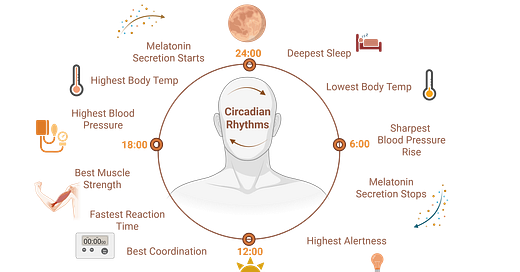Hey Rewire Collective!
This week we’re all about the sun – timely for the season, huh?
What is a Circadian Rhythm?
Your circadian rhythm is your body's internal clock. It cycles every 24 hours on average, and it influences when you feel alert, sleepy, hungry, and energetic!
At the centre of this clock is a small region in your brain called the suprachiasmatic nucleus (SCN). Think of it as your body's master timekeeper. It coordinates the release of hormones like melatonin (which makes you feel sleepy) and cortisol (which helps you feel awake and alert), aligning them with your environment, especially light (1, 2).

Sunlight: The Great Synchronizer
Light is the most powerful tool we have to regulate our circadian rhythms.
Natural sunlight in the morning, particularly blue light, triggers the SCN to suppress melatonin and release cortisol, making you feel alert and resetting your internal clock (3). This is why going outside within the first hour of waking is so effective for boosting energy and regulating your sleep-wake cycle (4).
P.S. This is why, along with some other tips for better sleep, I recommend morning sunlight in my book!
On the flip side, exposure to artificial light at night (especially from screens) confuses this system. It tricks your brain into thinking it's still daytime, suppresses melatonin, and delays sleep (5). This is one reason using your phone first thing in the morning or last thing at night can mess with your focus and mood throughout the day (6, 7).
Night Shifts: When Your Brain Fights the Clock
Night shifts are especially bad for your body: working through the night and sleeping during the day puts your circadian rhythm completely out of sync with your environment and your biology.
Night shift workers often struggle with sleep, mood, attention, and even metabolic health (8). The International Agency for Research on Cancer has classified long-term night shift work as a probable carcinogen due to its disruption of natural circadian cycles (9). Your biology is designed to sleep when it’s dark and be awake when it’s light. Forcing the opposite causes biological stress (10).
Why Timing Matters
Circadian rhythms don’t just control when you sleep. They also shape when you’re most focused, creative, or physically capable.
Mental performance tends to peak in the mid-morning for most people (11).
Physical strength and coordination often peak in the late afternoon (12).
Motivation and goal-directed behaviour are strongly tied to circadian-controlled dopamine levels (13).
Trying to force high-level focus or creativity outside your peak rhythm is like trying to sprint through water - it can be done, but it’s draining and inefficient!
What You Can Do
⏱ Know your chronotype
Are you a morning lark, a night owl, or somewhere in between? This is partly genetic (14), and fighting it will only leave you foggy and frustrated.
🌞 Get sunlight in the morning
Aim for 5-10 minutes outside soon after waking. This anchors your circadian clock, boosts cortisol, and sets the stage for better sleep that night (3, 4).
📵 Avoid screens first and last thing
The dopamine spike from social media, plus the light exposure, disrupts your natural rhythm (6, 7).
🌙 Respect your rhythm, if you can
If possible, align your most demanding tasks with your natural peaks. Don’t schedule creative work at 4PM if your brain shuts down at 3.
🧠 Forgive your ‘slumps’
You’re not lazy, you’re just out of sync. Not every hour is meant to be high-performance. Use the slow times to rest, plan, or refuel.
Until Next Week,
Nicole x
P.S. Leave any requests for future newsletters in the comments!
References





Love this, very useful to know that my brain literally cant be on peak performance at all hours. Time to accept my limitations that are hard coded by biology! Could you create a newsletter about enlightenment and what that does to the brain in future? I reckon monks and awakened people would have a very different brain to the average person :)